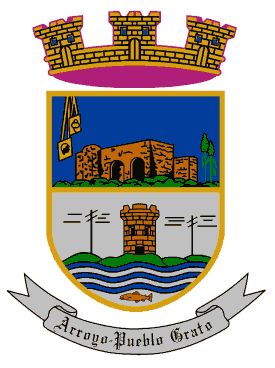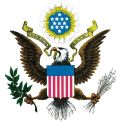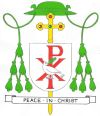Arroyo: Difference between revisions
Knorrepoes (talk | contribs) m (Text replacement - ".jpg|center]] ====Official blazon====" to ".jpg|center|Arms of {{PAGENAME}}]] ====Official blazon====") |
Knorrepoes (talk | contribs) m (Text replacement - "|}↵===Origin/meaning===" to "|} ===Origin/meaning===") |
||
| (15 intermediate revisions by the same user not shown) | |||
| Line 1: | Line 1: | ||
'''ARROYO''' | |||
Territory : [[Puerto Rico]] | |||
[[File:arroyo.jpg|center|Arms of {{PAGENAME}}]] | [[File:arroyo.jpg|center|Arms (crest) of {{PAGENAME}}]] | ||
= | {| class="wikitable" | ||
|+Official blazon | |||
|- | |||
|'''English''' | |||
| blazon wanted | |||
|} | |||
===Origin/meaning=== | |||
The arms were granted on March 31, 1970.<br/> | The arms were granted on March 31, 1970.<br/> | ||
The Old Church in ruins represents the historical monument where Arroyo began. The scapulary symbolizes the patron saint, Virgen del Carmen (Virgin Carmen). The guajanas flowers symbolise the sugar cane of Arroyo and the Sugar central station of Lafayette. The telegraph posts symbolizes the installation of the telegraphic line by the inventor Samuel B. Morse. The sea and the fish represent the fishermen and the fishing industry of the town. The old tower symbolizes the patriotic fights of the arroyans in the "Sierrita". The green landscape represents the vegetation of Arroyo. The banner with the municipality name Arroyo and his nick name Pueblo Grato (Pleasing Town). | The Old Church in ruins represents the historical monument where Arroyo began. The scapulary symbolizes the patron saint, Virgen del Carmen (Virgin Carmen). The guajanas flowers symbolise the sugar cane of Arroyo and the Sugar central station of Lafayette. The telegraph posts symbolizes the installation of the telegraphic line by the inventor Samuel B. Morse. The sea and the fish represent the fishermen and the fishing industry of the town. The old tower symbolizes the patriotic fights of the arroyans in the "Sierrita". The green landscape represents the vegetation of Arroyo. The banner with the municipality name Arroyo and his nick name Pueblo Grato (Pleasing Town).'''[[Civic Heraldry Literature - United States|'''Literature''']]''': | ||
{{us}} | |||
{{media}} | {{media}} | ||
Information and image from Nelson L. Román | |||
[[Category:Puerto Rico]] | [[Category:Puerto Rico]] | ||
[[Category:US cities and towns]] | |||
[[Category:Granted 1970]] | [[Category:Granted 1970]] | ||
Latest revision as of 15:31, 28 March 2024
ARROYO
Territory : Puerto Rico
| English | blazon wanted |
Origin/meaning
The arms were granted on March 31, 1970.
The Old Church in ruins represents the historical monument where Arroyo began. The scapulary symbolizes the patron saint, Virgen del Carmen (Virgin Carmen). The guajanas flowers symbolise the sugar cane of Arroyo and the Sugar central station of Lafayette. The telegraph posts symbolizes the installation of the telegraphic line by the inventor Samuel B. Morse. The sea and the fish represent the fishermen and the fishing industry of the town. The old tower symbolizes the patriotic fights of the arroyans in the "Sierrita". The green landscape represents the vegetation of Arroyo. The banner with the municipality name Arroyo and his nick name Pueblo Grato (Pleasing Town).Literature:
US heraldry portal
This page is part of the US heraldry portal |
Heraldry of the World |
|
US heraldry:
|
Ecclesiastical Heraldry of the USA:
Military Heraldry: |
Contact and Support
Partners:
Your logo here ?
Contact us
© since 1995, Heraldry of the World, Ralf Hartemink 
Index of the site
Information and image from Nelson L. Román















